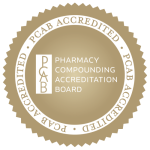It is a known fact that there are no quantitative differences between Progesterone secretion and serum levels in men and women outside the luteal phase. In a prospective cohort study of 1026 men with and without cardiovascular disease, there were no demonstrated age-dependent changes in serum progesterone concentrations. Yet, very little is known about the physiology and endocrinology in men as compared with women.
As mentioned in part I, when a practitioner considers testosterone therapy for hypogonadism, both in assessing and in the treatment plan, the other hormones (mistakenly considered only female sex hormones) – such as estrogen and progesterone are not usually taken into consideration.
Why should progesterone be taken into consideration when correcting hormonal decline/imbalance in andropause/hypogonadal men?
Progesterone is the precursor to many hormones, including testosterone, the sex hormone that emphasizes male characteristics, and estrogen, the sex hormone that emphasizes female characteristics.
Here are some of the functions Progesterone has in men:
- It influences spermatogenesis, sperm capacitation and testosterone biosynthesis in the testis.
- In men, progesterone has effects on the central nervous system (CNS) (mainly mediated by 5 alpha-reduced progesterone metabolites as so-called neuro-steroids), including blocking of gonadotropin secretion, sleep improvement, and effects on tumors in the CNS (meningioma, fibroma),
- Progesterone is a natural antidepressant,
- Progesterone regulates blood sugar,
- It regulates thyroid hormone production and can help reboot libido
- Progesterone affects the immune system,
- It affects cardiovascular system,
- Regulates building bone mass,
- Kidney function, as a natural diuretic,
- Converts fat into energy,
- Progesterone affects behavior, the respiratory system, and other physiological processes.
Let us go back for a minute to PART I and remember where the focus should be when considering hormone therapy with natural/bio-identical hormones = On physiology!
Aging is a physiological process.
As men age, testosterone levels decline and estrogen levels start to rise. Progesterone levels in men drop sharply as estrogen levels climb, causing symptoms such as:
- low libido
- gynecomastia — enlarged breasts
- hair loss
- erectile dysfunction
- weight gain
- impotence
- fatigue
- bone loss
- depression
- muscle loss
Aside from this, men who have low levels of progesterone have a greater risk of developing serious illnesses such as osteoporosis, arthritis, prostatitis and prostate cancer.
Progesterone – cancer connection in men
Progesterone helps prevent prostate disease by preventing testosterone from being converted into dihydrotestosterone, or DHT, which, when produced in excessive amounts, can cause damage and even cancer, according to the Natural Progesterone Information Service.
Another way progesterone helps reduce the risk of cancer is by suppressing the proliferative effects of estrogen that could lead to developing mutations and causing cancer.
In PART I we emphasized the need to understand and follow physiology to help with hormonal imbalance.
In PART I we also mentioned why supplementing only with testosterone for hypogonadism/andropause is not enough and maybe even harmful.
In PART II (here) we emphasize the importance of understanding the physiology of progesterone in men. Understanding the physiology will help us create a treatment plan from a functional perspective. This means that we can address the cause to have the best expected outcome for the individual as a whole.
Dr. Lee suggested men undergo progesterone replacement therapy using a maintenance dose of 8-12mg a day and 1-2mg per day of testosterone to protect against prostate cancer. — Dr John Lee, ‘What Your Doctor May Not Tell You About Prostate Health and Natural Hormone Supplementation’
TO BE CONTINUED….
Nurten Rasid, MD – Compounding Clinical Consultant @Haldey




